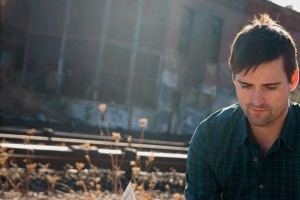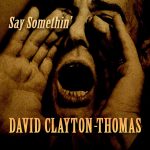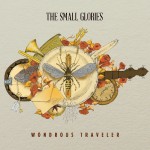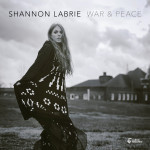 Following the folk/rock path blazed by singer-songwriters like Nick Drake and Elliott Smith, Ryan Hobler offers a unique, direct take on the genre’s standbys. His new album doesn’t come out until later this year, but the songs that have been released so far, such as “All Along” and “See What You’re Doing To Me,” give a glimpse at a songwriter with a distinct voice and maturity that is rarely seen these days. We spoke to Hobler about his songwriting process and the struggles that come with trying to be honest in song.
Following the folk/rock path blazed by singer-songwriters like Nick Drake and Elliott Smith, Ryan Hobler offers a unique, direct take on the genre’s standbys. His new album doesn’t come out until later this year, but the songs that have been released so far, such as “All Along” and “See What You’re Doing To Me,” give a glimpse at a songwriter with a distinct voice and maturity that is rarely seen these days. We spoke to Hobler about his songwriting process and the struggles that come with trying to be honest in song.
Elmore Magazine: What drew you to the folk/Americana music that you perform now?
Ryan Hobler: I’ve always gravitated towards primarily acoustic music. I was previously in a group that had acoustic guitar, upright bass, and piano. That core element has always been very natural to me. Something about the acoustic guitar and playing that instrument has always felt good. I actually started on the electric guitar and moved over to acoustic fairly quickly. The electric guitar didn’t speak to me as much.
EM: What kind of music were you playing on the electric guitar?
RH: It was very brief; this was back when I was in high school. It was mainly this Nirvana/Radiohead wannabe. Very mopey, very dour. I can certainly be mopey and dour, but something just opened up for me when I played an acoustic guitar.
EM: Some of your songs have a downbeat element to them, but there’s something uplifting about them, too. Is that something that came with your shift in style?
RH: Yeah, it’s funny: as I was saying how mopey and dour electric guitars are, I was thinking, “Well, a lot of my tunes are kind of mopey.” [laughs] I would say bittersweet is a better word. But honestly, I would attribute that perspective to me developing a philosophy or viewpoint on the world. I’ve read a lot of philosophy, a lot of books. That style stems from what I’ve read.
EM: What have you been reading?
RH: One big, huge book for me was Man’s Search For Meaning by Victor Frankel. It’s probably my all-time favorite book. It’s a hard book to say that you love, but it certainly transformed me after I read it for the first time in high school. Being the super-mopey, super-dour teenager that I was back then, reading that book was an eye-opener because it pieced together a lot of these ideas that I was thinking about but just couldn’t articulate. From there, I studied philosophy in college before switching to music, and I read a lot of the big philosophers: Camus, Nietzsche, and a lot the existential philosophers. They probably influenced me more than anything musical; I’m open to pretty much anything that appeals to me musically.
EM: With this new album, you worked with Andy Baldwin. What did he bring to the table?
RH: Andy Baldwin is amazing. He’s probably one of the most positive and exuberant people that I’ve ever met. The way he looks on the world and looks at each song that I brought to him was magical. I couldn’t speak more highly of him. He never looks at anything problematically; he looks at things as challenges. I could bring him a song that’s 80% done, and he’ll mix it and add all these little sonic elements to it, and he ends up opening up the song in ways that I never imagined.
I usually bring him a song where I feel a little worried about how it is. It’s a bit of a nervous artist thing where you give the song to your producer in its rawest form, but Andy would look at my songs and say, “There’s something special here.” He puts an amazing gloss on the music, and he ties so many things together on the songs that it’s just incredible.
I’m an audio engineer, too; I work mainly in post-production, but I have a lot music production experience. For me to bring a song in to Andy’s studio and to see him work with so many sounds is great. I feel like a kid in a candy store, just totally geeking out. He has such an amazing variety of gear and such a vast knowledge of all this stuff.
EM: Some of your songs feature a direct approach to lyrics; “All Along” stands out in this regard. What about this approach appeals to you?
RH: Well, that particular song was one that I wrote fairly quickly. I’ve heard other songwriters talk about how they’ll write a song in 5-10 minutes or something like that. I don’t think I wrote it that quickly, but it was quick for me, being the revisionist that I am. It just felt as if it was coming out of me that it just seemed true. It felt right to come from this honest, direct standpoint because there was no way around it. In general, whenever I can capture an emotion in a song and share it with people, my biggest challenge is to stay in that emotional place and write from that place. Whenever I do, I feel really happy with how it turns out. “All Along” was one of those times when I felt I captured that idea perfectly; I stayed in that space.
It’s a daunting thing for me, because I feel I have many a wall to break down when I approach any song. That’s usually the hardest part about writing a song, is getting into an emotional place and staying in that place. It’s hard to avoid comfort zones in order to stay in one mindset and—I know this is vague—to follow the song.
EM: The “wall” is an interesting way of putting things. What do you mean by that?
RH: Basically, when I say that, I’m talking about creative walls. From a creative standpoint, I can find it really hard to focus and connect with that certain something that you strive for. It might be there, but it can be this cloudy thing in your head, and if you dive into it, you can’t really see what it is. Sometimes—maybe because I’m afraid of what comes out or I’m insecure of confronting an element of myself that’s coming out—I find myself actively putting up walls to keep myself from addressing that. Particularly with “All Along,” I just dove into that place and stayed there until the song was done, and that’s what I typically strive for. I always try to get to that emotional place, and it’s hard sometimes.
EM: Any sort of artistic expression can be scary, yeah.
RH: Yeah! It’s a funny thing: you want to write a song, but you’re also afraid of that song. I am, at least. I’m kind of afraid of what song will come out of me.
EM: It’s a mysterious thing.
RH: Yeah, it’s strange. I haven’t quite figured it out for myself. I’ve talked about this quite a bit, and the main thing to do is to focus on the whole and not get bogged down in particulars like wording and rhyme schemes. When I don’t spend so much time focusing on that, the song flows much more easily.
“All Along” was funny, because when I was writing that, I didn’t think there were any rhymes in the song. Looking at it now, there are a few near-rhymes, but it came out just as it is now, and I thought, “Oh wow, it doesn’t even rhyme.” Essentially, I managed to keep focus on that one and not get so wrapped up in the mechanics of writing it.
EM: It sounds like you used a very spontaneous approach to songwriting. Did you do that for the entire album?
RH: Oh, I wish I could’ve done that for the whole album! [laughs] No, but I do always strive for that when writing songs. I’m always really concerned with how songs play out and how the lyrics take the listener along with them. Usually, that requires a little bit of work, and I wish they came out as easily as some of them do. A few came very easily, but a few took their sweet time, as well.







[…] who, despite the inclement weather, had turned up for the sonic warmth created by singer/songwriter Ryan Hobler. They all made the arctic journey to celebrate the release of Hobler’s new album, The […]